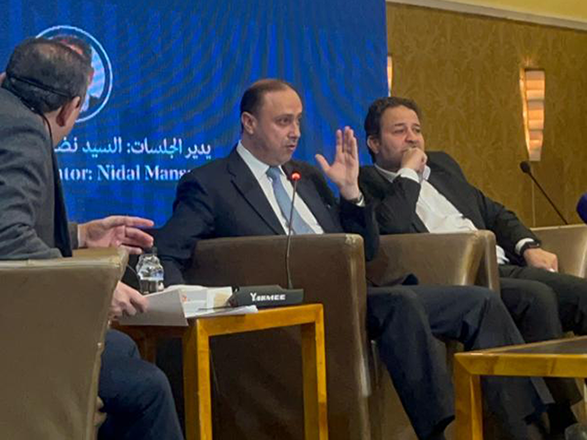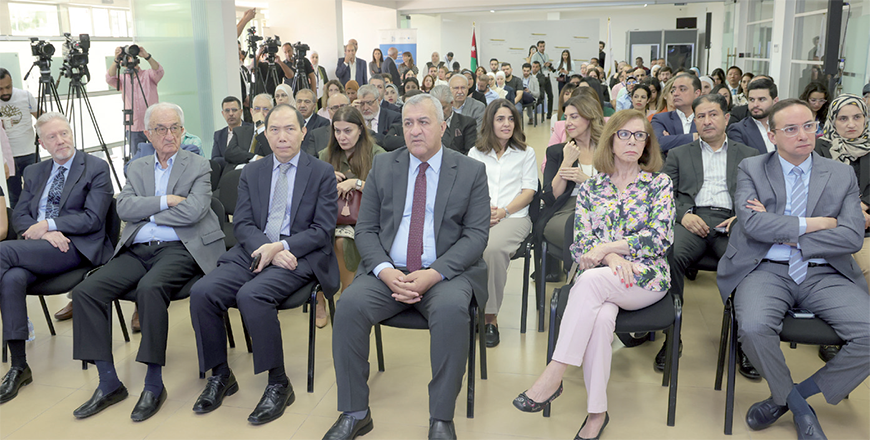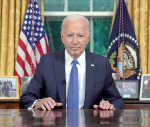You are here
Analysts discuss local media’s coverage of Israeli war on Gaza, emphasise need for proactive narrative, global influence
By Maria Weldali - Dec 06,2023 - Last updated at Dec 06,2023

Former Minister of State for Media Affairs Mohammad Momani on Tuesday during a discussion session organised by the Centre for Defending Freedom of Journalists Media Forum (By Maria Weldali)
AMMAN — The Jordanian media has depicted local public opinion trends in its coverage of the Gaza conflict, yet it has been unable to influence global public sentiment and opinion, former minister of state for media affairs Mohammad Momani said on Tuesday.
During a discussion session organised by the Centre for Defending Freedom of Journalists (CDFJ) Media Forum, Momani said local news outlets must enhance their capabilities to reach a global audience, underscoring the crucial need to strengthen the presence of local English-language news platforms.
Discussing the media’s role and Israel’s defeat in the media battle, Momani said that “the world is censoring pro-Palestine voices, with 95 per cent of global walkouts being organised in solidarity with Palestine”.
Momani also highlighted the journalistic objectivity and balance notion in conflict reporting. He said that the guiding notion of any journalistic work is truthfulness, which enables the creation of strong narratives, “The truth cannot be a fabrication... and the truth in this war in particular has imposed itself strongly.”
Meanwhile, former minister of culture and youth Mohammad Abu Rumman said that local news outlets havereflected opinions expressed by the public, openly reporting demonstrations and protests against Israel’s war on Gaza.
He underlined that the war on Gaza exposed the bias of Western media in its coverage of the war, highlighting the need to tailor a proactive media strategy that elevates and generates stories of interest for both local and international audiences.
“There has been some sort of chaos in Jordanian media [in its coverage of the current war] in the sense that media agenda and policies were not framed,” according to Abu Rumman who explained that the proactive Jordanian diplomatic efforts were not supported with a clear media narrative that “reflects the true Jordanian position toward Gaza”.
Abu Rumman underscored that journalists and media professionals cannot be detached from the current discourse on Gaza. “The media narrative should not be separated from the political narrative... media has altered the balance of power and has become a built-in part of the military battle,” Abu Rumman highlighted.
The CDFJ’s Media Forum presented through three different discussion sessions with media experts and former cabinet ministers, various perspectives on a board range of issues related tothe narrative warduring the reporting of the Israeli war on Gaza.
The session also covered the role of social media in changing the course of the war, as well as shaping the narrative of the conflict.
The sessions initiated a reflective process on media practices concerning war and armed conflicts.
Related Articles
AMMAN — Western media outlets’ reluctance to name Israel as the perpetrator of Al Jazeera’s Palestinian reporter Shireen Abu Akleh’s assassi
AMMAN — HRH Princess Rym Ali attended on Saturday the launch of the Media Literacy Academy, organised by the Jordan Media Institute (JMI) in
AMMAN — With the Israeli war on Gaza taking its deadly toll on journalists, International Federation of Journalists (IFJ) said that February
















